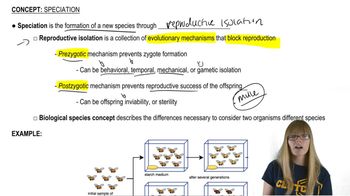Where are the major regulatory points in the cell cycle?
Table of contents
- 1. Introduction to Genetics51m
- 2. Mendel's Laws of Inheritance3h 37m
- 3. Extensions to Mendelian Inheritance2h 41m
- 4. Genetic Mapping and Linkage2h 28m
- 5. Genetics of Bacteria and Viruses1h 21m
- 6. Chromosomal Variation1h 48m
- 7. DNA and Chromosome Structure56m
- 8. DNA Replication1h 10m
- 9. Mitosis and Meiosis1h 34m
- 10. Transcription1h 0m
- 11. Translation58m
- 12. Gene Regulation in Prokaryotes1h 19m
- 13. Gene Regulation in Eukaryotes44m
- 14. Genetic Control of Development44m
- 15. Genomes and Genomics1h 50m
- 16. Transposable Elements47m
- 17. Mutation, Repair, and Recombination1h 6m
- 18. Molecular Genetic Tools19m
- 19. Cancer Genetics29m
- 20. Quantitative Genetics1h 26m
- 21. Population Genetics50m
- 22. Evolutionary Genetics29m
19. Cancer Genetics
Overview of Cancer
Problem 8
Textbook Question
What is apoptosis, and under what circumstances do cells undergo this process?
 Verified step by step guidance
Verified step by step guidance1
Understand that apoptosis is a form of programmed cell death, a controlled process by which cells orderly dismantle themselves without causing harm to the surrounding tissue.
Recognize that apoptosis is different from necrosis, which is uncontrolled cell death due to injury or damage.
Identify the key circumstances under which cells undergo apoptosis, such as during normal development (e.g., shaping organs), eliminating damaged or infected cells, and maintaining tissue homeostasis.
Note that apoptosis can be triggered by internal signals like DNA damage or external signals such as binding of death ligands to cell surface receptors.
Summarize that apoptosis is essential for organismal health by removing unwanted or potentially harmful cells in a regulated manner.
 Verified video answer for a similar problem:
Verified video answer for a similar problem:This video solution was recommended by our tutors as helpful for the problem above
Video duration:
47sPlay a video:
Was this helpful?
Key Concepts
Here are the essential concepts you must grasp in order to answer the question correctly.
Apoptosis
Apoptosis is a programmed cell death process that allows cells to die in a controlled and regulated manner. It is essential for maintaining tissue homeostasis and eliminating damaged or unnecessary cells without causing inflammation.
Recommended video:
Guided course

Cancer Characteristics
Triggers of Apoptosis
Cells undergo apoptosis in response to various internal and external signals, such as DNA damage, oxidative stress, infection, or developmental cues. These triggers activate signaling pathways that initiate the apoptotic process.
Recommended video:
Guided course

Cancer Characteristics
Mechanisms of Apoptosis
Apoptosis involves a series of molecular events including activation of caspases, mitochondrial membrane permeabilization, and DNA fragmentation. These mechanisms ensure the cell is dismantled efficiently and safely.
Recommended video:
Guided course

Speciation

 9:46m
9:46mWatch next
Master Cancer Characteristics with a bite sized video explanation from Kylia
Start learningRelated Videos
Related Practice
Textbook Question
571
views
